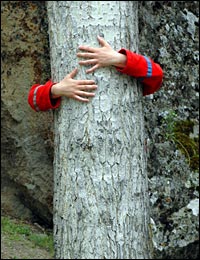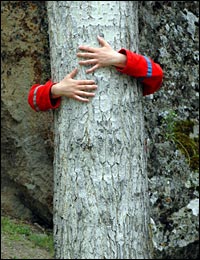Anyone who ever sympathized with Eric Cartman‘s declaration, “I hate hippies! … I want to kick ’em in the nuts” probably finds the word “tree-hugger” useful — and plenty of other people dig the word, too.

Maybe you’d rather be a vile SUV-cuddler?
Photo: iStockphoto
At this point, it’s hard to imagine the vocabulary of environmentalism or insults without “tree-hugger” and “tree-hugging.” And these ol’ chestnuts continue to spawn variations: tree-huggitude, tree-huggery, tree-huggage, tree-huggy, tree-huggish, non-tree-hugging, and treehugtastic were all google-able by this intrepid reporter.
The terms often punctuate news stories too. Last month, in The Financial Times, Paul Miles claimed that “caustic columnists” consider independent yogurt-makers such as himself to be “tree-hugging loonies.” In August, New Hampshire’s state environmental commissioner, Michael Nolin, caught heat for standing by while a fellow administrator dismissively referred to “tree-huggers” — guess Nolin forgot his job was to be the state’s tree-hugger-in-chief. Then there was the British Wind Energy Association’s “touch a turbine” campaign this spring to encourage folks to learn about, touch, and — you guessed it — hug wind turbines. The campaign was described in the London Sunday Times as “21st-century tree-hugging.”
What are the roots of this popular pejorative? Many sources claim “tree-hugger” was born as part of the 1970s-era Chipko movement in India, which involved peaceful resistance and literal tree-hugging. Unfortunately, this logical explanation is as full of crap as the popular etymology of “crap,” a word that was not spawned by the tastefully named plumber Thomas Crapper. According to the Oxford English Dictionary — the bible of the English language, but with fewer severe weather events — “tree-hugger” has been out there since at least 1965. The first example discusses a battle in Appleton, Wis., between “the tree huggers and the city.” The OED goes on to show the depreciative, positive, and even literal meanings of the term, including an example about a Barnum and Bailey circus monkey.
Only one related insult is even semi-established: the slur “panda-hugger,” which refers to supporters of China, not cuddlers of adorable bears. But a new frontier for hugging was opened on the Feb. 7, 2006, Colbert Report, when Stephen Colbert’s attack-poodle character chewed on the leg of former CIA director James Woolsey. As Woolsey explained why drilling in the Arctic National Wildlife Refuge was a bad idea, Colbert interrupted with a question that was probably raised for the first time in all of human discourse: “You’re not a caribou-hugger, are you?” Making hug-related allegations is a habit for Colbert, who has slammed other evildoers with the labels “Bill-of-Rights-hugger,” “Constitution-hugger,” and “lung-hugger.”
As has been noted by everyone and that circus monkey’s uncle, Colbert is a pitch-perfect spoof of the right. The movement’s first-rate (first-grade?) name-calling tactics are summed up admirably by the title of linguist Geoffrey Nunberg’s recent book Talking Right: How Conservatives Turned Liberalism into a Tax-Raising, Latte-Drinking, Sushi-Eating, Volvo-Driving, New York Times-Reading, Body-Piercing, Hollywood-Loving, Left-Wing Freak Show.
Nunberg claims that conservatives have done more than just tap into conceptual frames (see: George Lakoff) and coin effective catchphrases (see: “cut and run”). He says they’ve appropriated the language of politics on a very basic level, including structures like the “Volvo-driving, sushi-eating” compounds. Though the book is a careful, focused analysis of Republican and Democrat language use, one message comes through that’s a lot less sophisticated than the style and author: name-calling works, and tree-huggers of all sorts ought to do more of it.
To help the cause, I’ve developed this handy list for the vocabulary-deprived on the left. When talking about a right-wing non-friend of the environment, please refer to the following linguistic options. By combining items from columns A, B, and C, any patriotic American can develop trusty insults along the lines of “Machiavellian oil-licker” or “vile extinction-embracer.”
| A crafty malevolent two-faced vile nefarious lowdown Machiavellian crooked despicable treacherous lecherous foul |
B corporation carbon dioxide oil SUV pesticide nuke global warming smog hazardous waste extinction Bush Cheney |
C kisser stroker spooner cuddler canoodler licker nurser massager squeezer groper embracer Frencher |
Like our politically dominant foes, we must be childish and patient. It will probably take a few election cycles before a Democratic candidate for president is ready to talk smack like “crafty Cheney-Frencher,” but we can lay the groundwork now.
Then we’ll see how the nuke-nursers and corporation-canoodlers like it.



